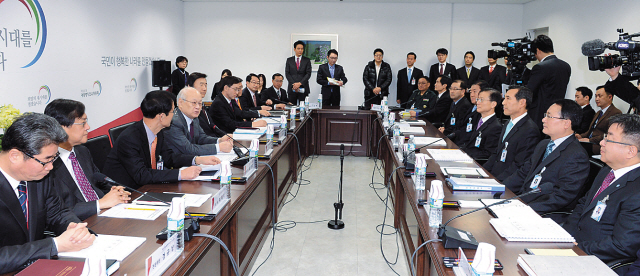Incoming leader Park Geun-hye plans to set up a new presidential body to serve as a nerve center for crisis management and diplomatic and defense policies in order to better cope with North Korean threats and the fast-changing security environment.
Her aides said the national security bureau will be installed at Cheong Wa Dae and led by a Cabinet-level official, who will be not only the chief security adviser to the president but also the top channel for long-term strategy planning, inter-agency coordination and contingent responses.
During the campaign, Park pledged to revamp the security apparatus in the presidential office after the current government came under fire for a series of intelligence lapses and bungled handling of North Korea’s military provocations.
The centralized structure could ensure policy consistency, wider intelligence gathering and prompter responses.
But critics caution that it could result in crucial decisions being swayed by a few aides to the next leader, who has long been criticized for disregarding communications with outsiders and experts, while ministries are sidelined and reduced to the simple role of enforcement.
As the primary rationale, Park has emphasized the need to improve and expedite top-level policy decision process.
“I want a government that clearly undertakes responsibilities through a control tower that connects all agencies with no overlap so that they fluidly communicate over policy,” Park told the transition team last week.
 |
Defense Ministry officials brief the presidential transition committee on Friday. (Ahn Hoon/The Korea Herald) |
Much about the new organization remains inconclusive as the transition officials are still discussing its role, status and structure and studying past examples at home and abroad.
Yun Byung-se, a key foreign policy aide, recently provided the clearest definition of its role as “policy coordination, crisis management and mid- and long-term strategic planning.”
The former deputy foreign minister is a senior member of the transition committee‘s division of foreign affairs and national defense.
The office will also play a crucial role in fleshing out Park’s new approach to both engage and denuclearize North Korea.
The new body is expected to incorporate the two existing presidential teams each in charge of foreign affairs and defense, and intelligence analysis and crisis management. The two organizations are headed by a vice-minister-level secretary.
The chief of the new office will be upgraded in hierarchy as he or she could lead consultations with the Foreign Ministry, Defense Ministry, Unification Ministry, National Intelligence Service and other agencies.
“There is a need for such an institution because every minute counts in terms of crisis management and you need immediate action in case of contingencies,” said Koh Yu-hwan, a North Korean studies professor at Dongguk University in Seoul.
“But there may be side effects if they overly limit other ministries’ autonomy or if security policies are strictly concentrated to within the national security office.”
The Lee Myung-bak government has taken flak for slack policy coordination and a disparity of positions between related agencies in the face of security crises.
The dual structure of policy planning and crisis management functions at Cheong Wa Dae has also been blamed for impeding swift actions when North Korea attacked the South’s Cheonan corvette and shelled Yeonpyeong Island in 2010.
“The current administration’s lack of a control tower has exposed inconsistency and systemic problems when dealing with national security issues,” said Yang Moo-jin, a professor at the University of North Korean Studies in Seoul.
“There needs to be a policy coordinator to bring together all relevant agencies given the Korean Peninsula’s current status still in a state of war (technically) and under geopolitical circumstances influenced by major powers.”
The two Koreas technically remain at war as the 1950-53 Korean War ended with an armistice, not a peace treaty.
Some critics, meanwhile, say that the envisioned national security office amounts to reinstatement of former liberal presidents’ National Security Council, which Park herself sharply criticized for inefficiency.
The presidential advisory body was first introduced in 1963 by late dictator Park Chung-hee, the president-elect’s father. It played a bigger role under the Kim Dae-jung government that began in 1998.
Roh Moo-hyun, Kim’s successor, further empowered the organization with practical functions through a standing committee and secretariat.
Discontent with the NSC’s newly reinforced authority, the then-opposition Grand National Party, the predecessor of the ruling Saenuri Party, initiated a campaign in 2005 to reduce the secretariat’s workforce and limit its role to meeting arrangement, document management and other simple administrative affairs.
Under the leadership of Park Geun-hye, the conservative party led a legislative amendment to dismantle the NSC and spin off its foreign and unification policy unit. President Lee finally scrapped it in 2008.
Yun, who also served as a senior security secretary of Roh, vowed to fix the NSC’s flaws and take lessons from the past experiences.
“We’ve seen pros and cons running similar organizations over the past 20 years,” he told a news conference last Tuesday.
“I hope the new system will be designed to hold out irrespective of future government changes.”
The national security office should remain streamlined and efficient, by confining its responsibility to crisis management and information gathering, said Hong Hyun-ik, a senior researcher at the private Sejong Institute.
“It should respect the autonomy of related ministries and center on integrating information and providing a fundamental guideline rather than detailed policymaking,” he said.
“With crisis management at its center, the control tower should not lay special stress on a particular agency, but leverage on each ministry’s strengths.”
By Shin Hyon-hee (
heeshin@heraldcorp.com)








